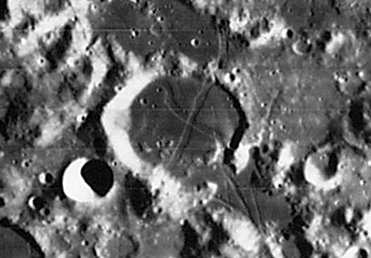Difference between revisions of "Palmieri"
| Line 16: | Line 16: | ||
[http://en.wikipedia.org/wiki/Palmieri_(crater) Palmieri]<br /> <br /> | [http://en.wikipedia.org/wiki/Palmieri_(crater) Palmieri]<br /> <br /> | ||
==Additional Information== | ==Additional Information== | ||
| − | Depth data from [[Kurt%20Fisher% | + | Depth data from [[Kurt%20Fisher%20Crater%20Depths|Kurt Fisher database]]<br /> |
* Westfall, 2000: 0.97 km | * Westfall, 2000: 0.97 km | ||
* Viscardy, 1985: 1.2 km | * Viscardy, 1985: 1.2 km | ||
Latest revision as of 02:08, 16 April 2018
Contents
Palmieri (and the remarkable "X" on its floor)
|
Lat: 28.6°S, Long: 47.7°W, Diam: 40 km, Depth: 0.97 km, Rükl 51 |
Images
LPOD Photo Gallery Lunar Orbiter Images Apollo Images
Maps
(LAC zone 93D4) LAC map Geologic map
Description
Description: Wikipedia
Additional Information
Depth data from Kurt Fisher database
- Westfall, 2000: 0.97 km
- Viscardy, 1985: 1.2 km
- Cherrington, 1969: 1.18 km
The remarkable "X" on the floor of Palmieri
What is very curious about the crossing of both rilles on the floor of Palmieri is the rectangle-shaped depression at the very centre of the "X". Which one of the two rilles was first? Or did they appear simultaneously? Are there much more of these rectangle-shaped depressions on the moon? (created by rille crossings). Another such crossing is the one on the floor of the unnamed crater southwest of De Gasparis.
Nomenclature
Luigi Palmieri (April 22, 1807 - September 9, 1896) was an Italian physicist and meteorologist. Using a seismometer for the detection and measurement of ground tremors, Palmieri was able to detect very slight movements and to predict the eruption of volcanos. Using a modified Peltier electrometer, he researched atmospheric electricity. He developed a modified Morse telegraph. He improved the anemomete and pluviometer.
LPOD Articles
Bibliography
